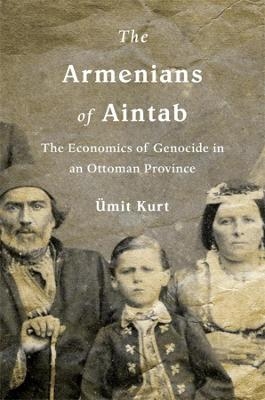
The Armenians of Aintab
The Economics of Genocide in an Ottoman Province
Seiten
2021
Harvard University Press (Verlag)
978-0-674-24794-9 (ISBN)
Harvard University Press (Verlag)
978-0-674-24794-9 (ISBN)
UEmit Kurt explores causes and effects of the Armenian genocide in his hometown of Gaziantep, Turkey. He finds that local gentry and ordinary Turks were heavily motivated by the prospect of financial gain as Armenians were dispossessed. Newly enriched Turks then financed the young republic, elevating themselves to the status of a political elite.
A Turk's discovery that Armenians once thrived in his hometown leads to a groundbreaking investigation into the local dynamics of genocide.
UEmit Kurt, born and raised in Gaziantep, Turkey, was astonished to learn that his hometown once had a large and active Armenian community. The Armenian presence in Aintab, the city's name during the Ottoman period, had not only been destroyed-it had been replaced. To every appearance, Gaziantep was a typical Turkish city.
Kurt digs into the details of the Armenian dispossession that produced the homogeneously Turkish city in which he grew up. In particular, he examines the population that gained from ethnic cleansing. Records of land confiscation and population transfer demonstrate just how much new wealth became available when the prosperous Armenians-who were active in manufacturing, agricultural production, and trade-were ejected. Although the official rationale for the removal of the Armenians was that the group posed a threat of rebellion, Kurt shows that the prospect of material gain was a key motivator of support for the Armenian genocide among the local Muslim gentry and the Turkish public. Those who benefited most-provincial elites, wealthy landowners, state officials, and merchants who accumulated Armenian capital-in turn financed the nationalist movement that brought the modern Turkish republic into being. The economic elite of Aintab was thus reconstituted along both ethnic and political lines.
The Armenians of Aintab draws on primary sources from Armenian, Ottoman, Turkish, British, and French archives, as well as memoirs, personal papers, oral accounts, and newly discovered property-liquidation records. Together they provide an invaluable account of genocide at ground level.
A Turk's discovery that Armenians once thrived in his hometown leads to a groundbreaking investigation into the local dynamics of genocide.
UEmit Kurt, born and raised in Gaziantep, Turkey, was astonished to learn that his hometown once had a large and active Armenian community. The Armenian presence in Aintab, the city's name during the Ottoman period, had not only been destroyed-it had been replaced. To every appearance, Gaziantep was a typical Turkish city.
Kurt digs into the details of the Armenian dispossession that produced the homogeneously Turkish city in which he grew up. In particular, he examines the population that gained from ethnic cleansing. Records of land confiscation and population transfer demonstrate just how much new wealth became available when the prosperous Armenians-who were active in manufacturing, agricultural production, and trade-were ejected. Although the official rationale for the removal of the Armenians was that the group posed a threat of rebellion, Kurt shows that the prospect of material gain was a key motivator of support for the Armenian genocide among the local Muslim gentry and the Turkish public. Those who benefited most-provincial elites, wealthy landowners, state officials, and merchants who accumulated Armenian capital-in turn financed the nationalist movement that brought the modern Turkish republic into being. The economic elite of Aintab was thus reconstituted along both ethnic and political lines.
The Armenians of Aintab draws on primary sources from Armenian, Ottoman, Turkish, British, and French archives, as well as memoirs, personal papers, oral accounts, and newly discovered property-liquidation records. Together they provide an invaluable account of genocide at ground level.
UEmit Kurt is Polonsky Fellow at the Van Leer Jerusalem Institute and teaches in the Department of Middle Eastern and African History at the University of Tel Aviv. He is author of several books in Turkish and English, including The Spirit of the Laws: The Plunder of Wealth in the Armenian Genocide.
| Erscheinungsdatum | 17.05.2021 |
|---|---|
| Zusatzinfo | 2 Maps |
| Verlagsort | Cambridge, Mass |
| Sprache | englisch |
| Maße | 156 x 235 mm |
| Themenwelt | Geisteswissenschaften ► Geschichte ► Regional- / Ländergeschichte |
| Geschichte ► Teilgebiete der Geschichte ► Wirtschaftsgeschichte | |
| Sozialwissenschaften ► Politik / Verwaltung | |
| ISBN-10 | 0-674-24794-9 / 0674247949 |
| ISBN-13 | 978-0-674-24794-9 / 9780674247949 |
| Zustand | Neuware |
| Haben Sie eine Frage zum Produkt? |
Mehr entdecken
aus dem Bereich
aus dem Bereich


